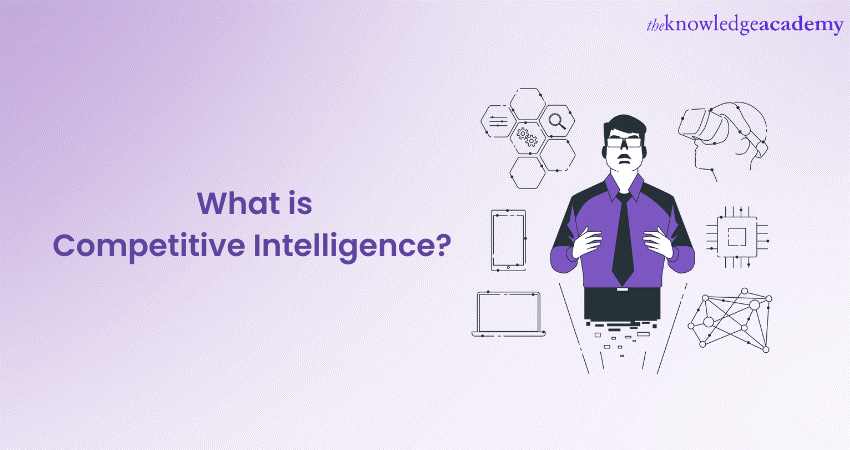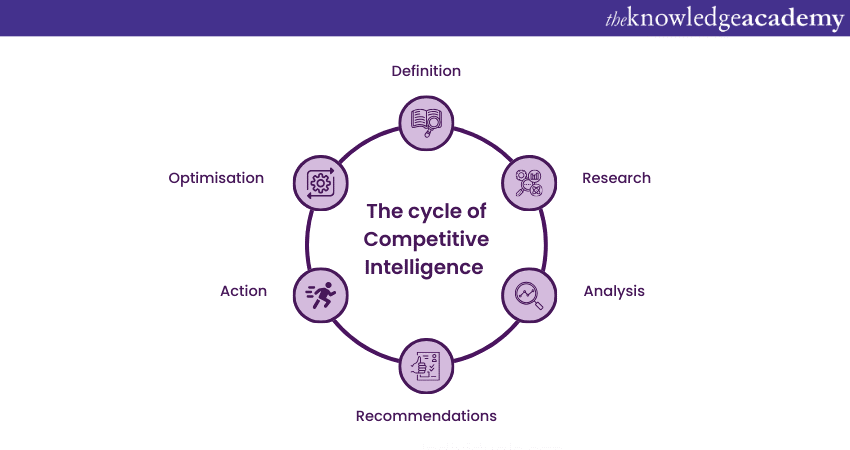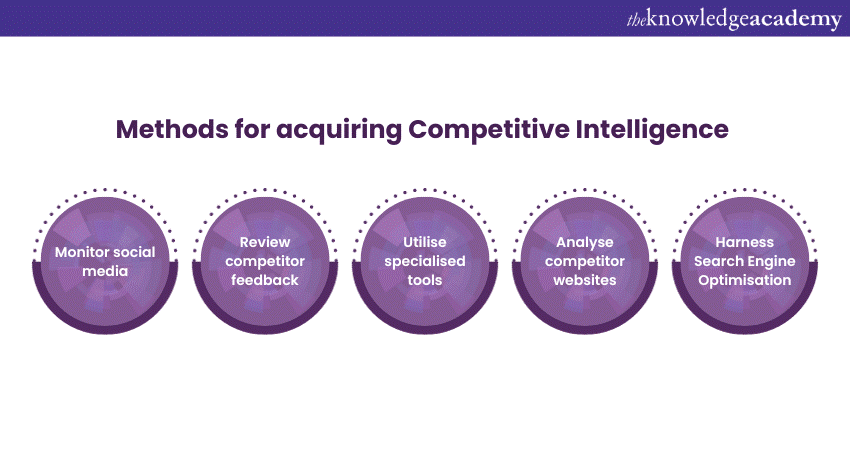We may not have the course you’re looking for. If you enquire or give us a call on 01344203999 and speak to our training experts, we may still be able to help with your training requirements.
Training Outcomes Within Your Budget!
We ensure quality, budget-alignment, and timely delivery by our expert instructors.

In the modern-day business environment, every decision can make or break success. Thus, having a deep understanding of your competitive landscape is paramount. This is where Competitive Intelligence steps in. But most businesses aren’t aware of What is Competitive Intelligence.
Competitive Intelligence is not a mere term; it's a systematic process of gathering, analysing, and interpreting information about your competitors, industry trends, and market conditions. Thus, it becomes crucial for businesses to understand this process in order to make well-informed decisions and stay ahead of the competition.
But how can an understanding of this process contribute to success? How can implementing this process lead to better outcomes? Read this blog to get answers to all your questions. Explore What is Competitive Intelligence, its types and how your business can attain success.
Table of Contents
1) Understanding What is Competitive Intelligence
2) Types of Competitive Intelligence
3) Objective of Competitive Intelligence
4) How does Competitive Intelligence work?
5) The Cycle of Competitive Intelligence
6) Methods for Acquiring Competitive Intelligence
7) Conclusion
Understanding What is Competitive Intelligence
Competitive Intelligence involves gathering and analysing information about competitors for an industry advantage without the need for secrecy or covert methods. It differs from corporate espionage, being open and honest rather than shady. It's akin to exploring a competitor's activities without resorting to secretive tactics.
For instance, if a business sees a competitor trying something new on their website, the marketing team can decide to adopt a similar strategy with little resistance from stakeholders. It saves time in decision-making.
Expertise in Competitive Intelligence allows strategic decisions to be made with informed suggestions. It frees decision-making from the top-paid person (referred to as the Highest-Paid Person in the Room's Opinion or HIPPO) and removes uncertainty and guesswork.

Types of Competitive Intelligence
After learning about What is Competitive Intelligence, it’s time to understand its types. This process is divided into Tactical and Strategic activities. Tactical efforts are short-term, addressing goals like market share and revenue increase. Strategic Intelligence looks at longer-term concerns, such as key risks and opportunities for the enterprise. Here's a detailed explanation of these types:
1) Tactical Competitive Intelligence
Tactical Competitive Intelligence involves short-term activities geared towards achieving specific business objectives. This includes gathering data to inform decisions related to immediate challenges, such as capturing market share and enhancing revenue streams. The focus is on obtaining actionable insights that contribute directly to the operational efficiency and competitiveness of the business in the near term.
Master the competitive landscape! Learn the step-by-step Competitive Intelligence process to stay ahead.
2) Strategic Competitive Intelligence
On the other hand, Strategic Competitive Intelligence is a longer-term approach that addresses overarching issues that influence the enterprise's future. It revolves around identifying and understanding key risks and opportunities that may shape the business landscape in the extended horizon. This form of Intelligence guides high-level decision-making and aids in formulating comprehensive strategies for sustainable success.
Discover the top tools for effective Competitive Intelligence. Enhance your strategic decision-making!
Objective of Competitive Intelligence
In his book "Superforecasting," popular author Philip Tetlock emphasises that the role of Competitive Intelligence is to honestly inform the truth to those in charge, not just tell the leaders what they want to hear.
The core objective of Competitive Intelligence is to empower organisations with a strategic advantage by providing insights into their competitive environment. It goes beyond the surface-level understanding of competitors and aims to deliver a deeper comprehension of market forces, industry trends, and potential disruptions.
Escalate your business intelligence skills with our Business Objects Web Intelligence Reporter Course for comprehensive reporting expertise – join today!
How does Competitive Intelligence work?
Competitive Intelligence works performing the following:
a) Systematically gathering and analysing information about competitors
b) Studying market trends
c) Industry dynamics to inform strategic decision-making
Unlock the power of data with the latest Business Intelligence platforms. Find the right solution for your business!
This process involves collecting data from various sources, such as public records, industry reports, and competitor communications. Analysts then evaluate and interpret this information to identify competitors' strengths, weaknesses, opportunities, and threats.
Ace your next interview! Prepare with these top Competitive Intelligence interview questions.
The gathered insights help businesses anticipate market changes, understand competitor strategies, and adapt their own approaches to gain a competitive edge. Competitive Intelligence is a continuous process, providing organisations with a proactive understanding of their business environment. By staying informed and responsive, companies can refine their strategies, mitigate risks, and seize opportunities in the ever-evolving landscape of their industry.
Uncover how Business Intelligence can transform your data into actionable insights. Learn more now!
The Cycle of Competitive Intelligence
Fouad Benyoub outlines a six-step closed loop for the Competitive Intelligence cycle. Here's a complete breakdown of this cycle:

a) Definition: The cycle initiates by identifying needs, metrics, and key areas for Intelligence research.
b) Research: Competitive Intelligence analysts employ tools like Crunchbase, MOAT, SimilarWeb, SpyFu, Talkwalker, Visualping, and Owler to gather intelligence.
c) Analysis: Data is analysed to generate meaningful information during the Competitive Intelligence process.
d) Recommendations: Alongside presenting information, Competitive Intelligence offers recommendations for optimising business operations.
e) Action: The success of a Competitive Intelligence program is measured by its impact on building brand loyalty, customer connection, repeat e-commerce sales, and client retention, depending on the actions taken.
f) Optimisation: Often overlooked, this phase requires the Competitive Intelligence analyst to actively seek and assess feedback. This helps ensure a continuous improvement in the quality of recommendations throughout the Competitive Intelligence cycle.
Explore the world of Business Intelligence with our courses on Business Intelligence Reporting - join today!
Methods for Acquiring Competitive Intelligence
It's time to explore five dependable methods for acquiring Competitive Intelligence to enhance your digital marketing strategies. So, let’s have a quick look at all of them:

a) Monitor social media: Keep a close eye on all the social media platforms, letting customer comments provide valuable insights into how your products are perceived relative to competitors.
b) Review competitor feedback: Examine customer reviews for both your products and those of competitors. As a result, you can gain insights into strengths, weaknesses, and areas for improvement in your offerings.
c) Utilise specialised tools: Employ various tools designed for competitive analysis. This will enable you to stay abreast of changes in your competitors' strategies and proactively respond to shifts in their positioning within your customer base.
d) Analyse competitor websites: Investigate your competitors' websites for comprehensive information on their products and services. This can serve as a prime source for staying updated on their offerings.
e) Harness Search Engine Optimisation: Leverage SEO tools to assess the dependence of your competitors' traffic on specific keywords, enabling you to monitor changes in their page rankings and inform your own strategic decisions.
Curious about a Business Intelligence Analyst’s earning potential? Check out the latest salary trends in your area!
Conclusion
Understanding What is Competitive Intelligence is key to maintaining a competitive edge. Numerous methods exist for gathering valuable insights from industry rivals, providing an advantage and boosting profits. So, embrace this process, anticipate market changes and respond strategically.
Unlock the power of Business Objects with our Business Objects Reporting Course –sign up now for exclusive business intelligence and reporting skills.
Frequently Asked Questions
Upcoming Office Applications Resources Batches & Dates
Date
 Business Objects Web Intelligence Reporter Course
Business Objects Web Intelligence Reporter Course
Thu 1st Jan 1970







 Top Rated Course
Top Rated Course


 If you wish to make any changes to your course, please
If you wish to make any changes to your course, please


